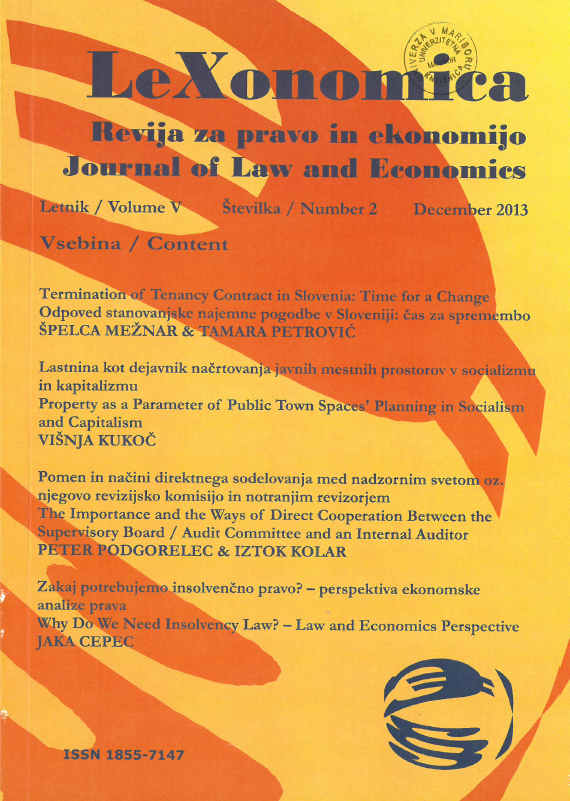Zakaj potrebujemo insolvenčno pravo?
Perspektiva ekonomske analize prava
Keywords:
insolvenčno pravo, problem skupnega delovanja, ekonomska analiza prava, priporniška dilema, učinkovitost, insolvency law, common pool problem, prisoners dilemma, law & economics, efficiencyAbstract
Zakaj potrebujemo insolvenčno pravo? perspektiva ekonomske analize prava
Avtor v prispevku predstavlja temelje ekonomske analize insolvenčnega prava, pri čemer pozornost namenja predvsem vzrokom za ekonomsko upravičenost obstoja insolvenčnega prava kot posebnega postopka za reševanje insolventnosti dolžnika ter cilje, ki jim naj z vidika ekonomske analize prava sledi insolvenčno pravo. Insolvenčno pravo potrebujemo zaradi minimiziranja izgub ob nastanku insolventnosti, saj je učinkovito rešitev mogoče najti samo s pravno regulacijo, ker pogodbeni dogovor med deležniki zaradi problema skupnega delovanja ni mogoč. Pravna regulacija postopkov zaradi insolventnosti mora predvidljivo in pregledno razporediti tveganja med deležniki insolvenčnega postopka, in sicer tako, da sledi kriteriju ex ante in ex post učinkovitosti, s čimer povečuje družbeno blaginjo.
Why Do We Need Insolvency Law? – Law and Economics Perspective
The paper presents the basic element of law and economics of insolvency law. It addresses the basic economic reasoning for the existence of insolvency law as a special procedure for solving the issues of an insolvent debtor and the objectives that the insolvency law should pursue. Insolvency law is needed to minimize losses upon the occurrence of insolvency, since contractual agreements between stakeholders, because of the collective action problem, are unlikely. Legal regulation of insolvency proceedings should provide a predictable and transparent procedure that allocates risks among the stakeholders based on the criteria of ex ante and ex post efficiency, thereby increasing social welfare.
Downloads
References
Baird, D. G., Gertner, R. H., Picker, R. C., (1994) Game Theory and the Law (Cambridge, Massachusetts: Harvard University press).
Cabrillo, F., Depoorter, B. W. (2000) Bankruptcy Proceedings, v Bouckaert B, De Geest G. (editors), Encyclopedia Of Law & Economics (Cheltenham, Northampton: Publishers Edward Elgar and The University Of Ghent).
Coase, R.H (1960) The Problem of Social Cost, 3 Journal of Law and Economics, str. 1–70. De Geest, G., Dari-Mattiacci, G.(2009) Carrots Versus Sticks, Washington U. School of Law Working Paper No. 09-09-03.
Eidenmüller, H. (2006) Trading in Times of Crisis: Formal Insolvency Proceedings, Workouts and the Incentives for Shareholders/Managers, European Business Organization Law Review, 7 (1), str. 239–258.
Goode, R. (2011) Principles of Corporate Insolvency Law (London: Sweet & Maxwell).
Hart, O. (2000) Different Approaches to Bankruptcy, Harvard Institute of Economic Research Paper No. 1903.
Jackson, T.H., (1996) Bankruptcy, nonbankruptcy, entitlements, and the creditors' bargain, v Bhandari, J.S., Weiss, Corporate Bankruptcy, Economic and Legal Perspectives (Cambridge: Cambridge University Press), str. 39–58.
McCormack, G. (2007) Control and Corporate Rescue: An Anglo-American Evaluation, The International and Comparative Law Quarterly, (56) 3, str. 515–551.
Osborn, M.J. (2004) An introduction to the Game Theory (Oxford: Oxford University Press). Posner, R. A. (1979–1980) The Ethical and Political Basis Of The Efficiency Norm In Common Law Adjudication, Hofstra Law Review 8, str. 487–507.
Rasmussen, R. K., & Skeel, D. A. (1995). The Economic Analysis of Corporate bankruptcy Law. American Bankruptcy Institute Law Review, 3, str. 85–115.
Shödermeier, M.D., Perochon, F. (2003) National Report for France v McBryde W.W., Flessner A., Kortmann S.C.J.J, Principles of European Insolvency law, Law of Business and Fincance, Volume 4, Kluwer Legal Publisher, Deventer, The Netherlands, str. 237–306. White, M. J. (2005) Economic Analysis of Corporate and Personal Bankruptcy and Law, NBER Working Papers 11536 (Cambridge Massachusetts: National Bureau of Economic Research).
White, M.J. (2001) Bankruptcy Procedures in Countries Undergoing Financial Crises, v Claessens S., Djankov S, and Mody A, Resolution of financial distress: an international perspective on the design of bankruptcy laws, World Bank Institute, World Bank, Washington, DC, str. 25–47.
Zajc, K. (2002) Ekonomska analiza prava (opis, zgodovina in aplikacije), Podjetje in delo, 6, str. 1687–1699.
Zajc, K. (2004) Coasov teorem, učinkovitost in imisije, Podjetje in delo, 1., str. 103–121.
Downloads
Published
Issue
Section
License
© Univerza v Mariboru, Pravna fakulteta, Univerzitetna založba
Prosti pristop
